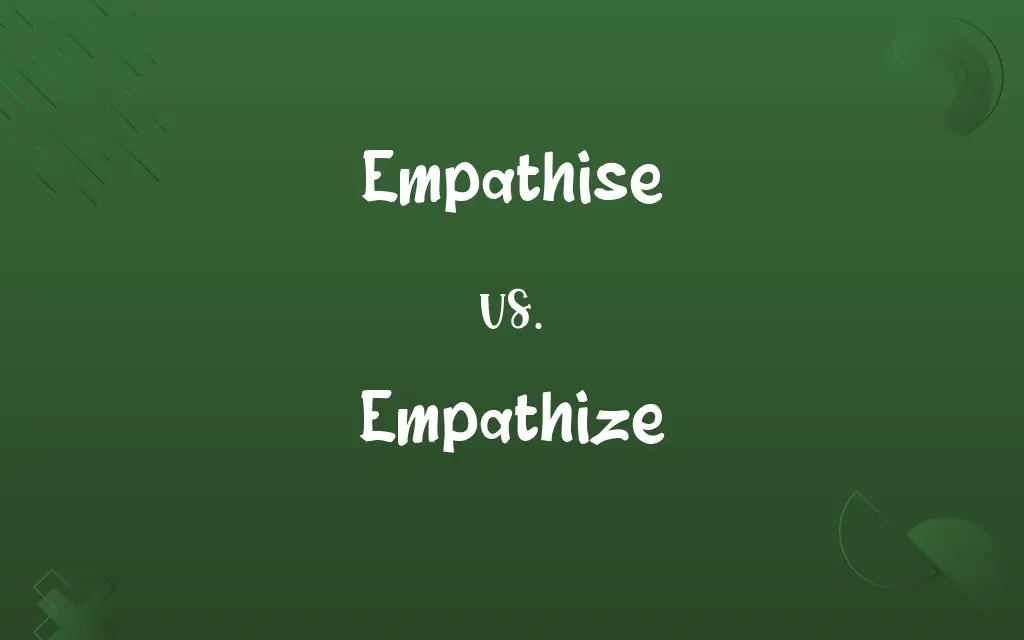Empathise vs. Empathize: Know the Difference

By Shumaila Saeed || Updated on December 27, 2023
Empathise and Empathize have the same meaning: to understand and share the feelings of another. The difference is in spelling: "Empathise" is British English, while "Empathize" is American English.

Key Differences
Empathise and Empathize both refer to the ability to comprehend and share someone else's feelings or emotions. The primary distinction between these two words lies in their regional spelling variations. "Empathise" is commonly used in British English, reflecting the typical British spelling pattern of "-ise" in words like "realise" and "organise."
Shumaila Saeed
Dec 27, 2023
Empathize, on the other hand, aligns with American English conventions, where the "-ize" suffix is predominant, as seen in words like "realize" and "organize." Despite the different spellings, both words stem from the Greek word "empathes," meaning "emotional."
Shumaila Saeed
Dec 27, 2023
The use of Empathise is more frequent in countries following British English norms, such as the United Kingdom, Australia, and New Zealand. The spelling reflects the broader linguistic preferences of these regions. In contrast, Empathize is predominantly used in the United States, where American English is the standard.
Shumaila Saeed
Dec 27, 2023
When it comes to pronunciation, Empathise and Empathize are pronounced the same way, with the emphasis on the first syllable: /ˈɛmpəθaɪz/. This similarity in pronunciation further underscores that the difference between the two is purely orthographic and not phonetic.
Shumaila Saeed
Dec 27, 2023
In conclusion, whether one uses Empathise or Empathize depends largely on the regional spelling conventions of British or American English. There is no difference in meaning or usage between the two, and both words are interchangeable, depending on the writer's or speaker's linguistic background.
Shumaila Saeed
Dec 27, 2023
ADVERTISEMENT
Comparison Chart
ADVERTISEMENT
Empathise and Empathize Definitions
Empathise
To understand and share another's feelings.
When she spoke about her loss, I could empathise with her grief.
Shumaila Saeed
Dec 27, 2023
Empathize
To share and understand the emotions of another.
He can empathize with his friend's struggles, as he has been through similar hardships.
Shumaila Saeed
Dec 27, 2023
Empathise
The ability to put oneself in someone else's shoes.
Teachers must empathise with students to understand their challenges.
Shumaila Saeed
Dec 27, 2023
Empathize
Emotional attunement to another's experience.
As a nurse, she has the ability to empathize with her patients' pain.
Shumaila Saeed
Dec 27, 2023
Empathise
Emotional resonance with another person's experience.
He could empathise with her anxiety, having faced similar situations himself.
Shumaila Saeed
Dec 27, 2023
ADVERTISEMENT
Empathize
To intuitively feel and reflect back someone's emotional state.
Through empathy, he could understand and empathize with her sadness.
Shumaila Saeed
Dec 27, 2023
Empathise
Empathising involves intuitively sensing and mirroring emotions.
Through her storytelling, the author makes readers empathise with the protagonist's journey.
Shumaila Saeed
Dec 27, 2023
Empathize
The act of placing oneself emotionally in someone else's position.
It's important to empathize with others to build strong relationships.
Shumaila Saeed
Dec 27, 2023
Empathise
A psychological identification with someone's feelings.
As a counselor, she learned to empathise with a wide range of emotions.
Shumaila Saeed
Dec 27, 2023
Empathize
A psychological process of connecting with someone's feelings.
Good leaders empathize with their team members' perspectives.
Shumaila Saeed
Dec 27, 2023
Empathize
To feel or experience empathy
Empathized with the striking miners.
Shumaila Saeed
Oct 19, 2023
Empathize
(intransitive) to feel empathy for another person
Empathize with someone
Shumaila Saeed
Oct 19, 2023
Repeatedly Asked Queries
Do Empathise and Empathize have the same pronunciation?
Yes, both are pronounced /ˈɛmpəθaɪz/.
Shumaila Saeed
Dec 27, 2023
Is the meaning of Empathise and Empathize exactly the same?
Yes, both words mean to understand and share someone else's feelings.
Shumaila Saeed
Dec 27, 2023
Is Empathise commonly used in the United States?
No, in the United States, Empathize is the common spelling.
Shumaila Saeed
Dec 27, 2023
Is Empathise used in American English?
No, Empathise is typically used in British English.
Shumaila Saeed
Dec 27, 2023
Which spelling should I use in academic writing?
Use the spelling that aligns with the regional standards of your institution.
Shumaila Saeed
Dec 27, 2023
Are there any differences in usage between Empathise and Empathize?
No, the usage is the same; only the spelling differs.
Shumaila Saeed
Dec 27, 2023
Does the spelling difference affect the definition?
No, the spelling difference does not affect the definition.
Shumaila Saeed
Dec 27, 2023
Is it incorrect to use Empathize in the UK?
Not incorrect, but Empathise is the preferred spelling in the UK.
Shumaila Saeed
Dec 27, 2023
Are there any variants of Empathise/Empathize?
No, these are the standard spellings in British and American English.
Shumaila Saeed
Dec 27, 2023
Are Empathise and Empathize interchangeable?
Yes, they are interchangeable in meaning but vary in regional spelling.
Shumaila Saeed
Dec 27, 2023
Can Empathize be used in British English?
Yes, but it's less common than Empathise in British English.
Shumaila Saeed
Dec 27, 2023
Is Empathise a newer or older form than Empathize?
Neither is newer or older; they developed concurrently in different regions.
Shumaila Saeed
Dec 27, 2023
Should I use Empathise or Empathize in an international context?
In international contexts, either is acceptable; consider your audience.
Shumaila Saeed
Dec 27, 2023
Do English learners need to know both spellings?
Yes, it's useful for English learners to recognize both spellings.
Shumaila Saeed
Dec 27, 2023
Can I use Empathise in scientific writing?
Yes, if following British English guidelines.
Shumaila Saeed
Dec 27, 2023
Will using Empathize in the UK be seen as an error?
Not an error, but it may be seen as following American English conventions.
Shumaila Saeed
Dec 27, 2023
Can Empathise be used in formal writing?
Yes, it can be used in formal writing in British English contexts.
Shumaila Saeed
Dec 27, 2023
Does Empathise appear in British dictionaries?
Yes, it appears in British dictionaries with the -ise suffix.
Shumaila Saeed
Dec 27, 2023
Are there any contexts where Empathise is not appropriate?
No, it's appropriate in any context where empathy is being described in British English.
Shumaila Saeed
Dec 27, 2023
Should I correct someone using Empathise in American English?
It's not necessary to correct them, but you can inform them of the regional preference.
Shumaila Saeed
Dec 27, 2023
Share this page
Link for your blog / website
HTML
Link to share via messenger
About Author
Written by
Shumaila SaeedShumaila Saeed, an expert content creator with 6 years of experience, specializes in distilling complex topics into easily digestible comparisons, shining a light on the nuances that both inform and educate readers with clarity and accuracy.








































































